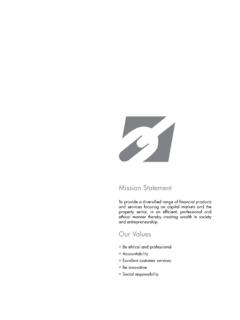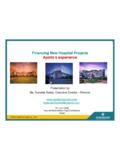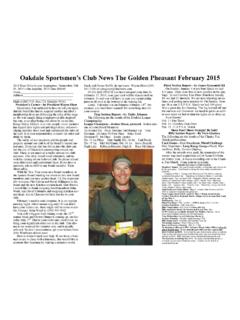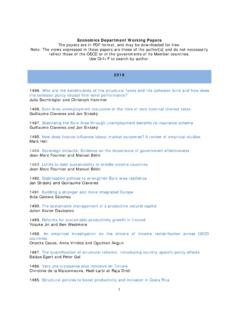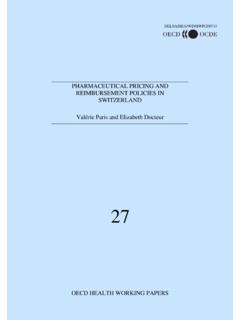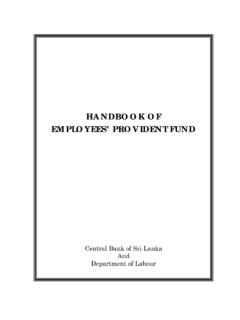Transcription of IN THE SUPREME COURT OF THE DEMOCRATIC …
1 1 IN THE SUPREME COURT OF THE DEMOCRATIC SOCIALIST REPUBLIC OF SRI LANKA In the matter of an application for Special Leave to Appeal to SUPREME COURT under and in terms of Articles 128(2) of the Constitution of 1978 read with the SUPREME COURT Rules of 1990 against the Order of the COURT of Appeal dated in (writ) No. 535/2010. SC APPEAL No. 150/2010 SC (SPL) LA Appl. No. 188/10 DFCC Bank, CA (Writ) No. 535/10 No. 73/5, Galle Road, Colombo 03. 1ST RESPONDENT-APPELLANT -Vs- Weliwita Don Kusumitha Mudith Perera, No.
2 112, Sewagama, Polonnaruwa. PETITIONER-RESPONDENT 1. Mrs. Induni Karunananda, Attorney-at-Law, Legal Officer-DFCC Bank, No. 73/5, Galle Road, Colombo 03. 2. Fonseka, General Manager-DFCC Bank, No. 73/5, Galle Road, Colombo 03. 3. Sewagama Rice Products (Pvt) Ltd, No. 112, Sewagama, Polonnaruwa. RESPONDENT-RESPONDENTS BEFORE : Hon. Saleem Marsoof, PC., J, Hon. Sathyaa Hettige, PC., J, and Hon. Priyasath Dep, PC., J. COUNSEL : Nigel Hatch, , with P.
3 Abeywickrama and S. Illangage for the Appellant. David Weeraratne with for the Respondents. ARGUED ON : 2. WRITTEN SUBMISSIONS ON : and DECIDED ON : 2 SALEEM MARSOOF J: This appeal arises from an order made by the COURT of Appeal on 17th September 2010, in the course of a writ application filed in terms of Article 140 of the Constitution in the COURT of Appeal by the Petitioner-Respondent, Weliwita Don Kusumitha Muditha Perera (hereinafter sometimes referred to as Muditha Perera ). By the said order, the said Muditha Perera was granted interim relief as prayed for in prayer (c) to the amended petition filed by him against the 1st Respondent-Appellant, DFCC Bank (hereinafter sometimes referred to as the DFCC Bank) restraining the DFCC Bank from selling by public auction the property mentioned in Mortgage Bond bearing No.
4 1811 dated 25th May 2009, attested by , Notary Public. It may be mentioned that the said Muditha Perera had cited three more parties as respondents to his amended petition filed in the COURT of Appeal, namely, the Legal Officer and Managing-Director of the DFCC Bank, who are the 1st and 2nd Respondent-Respondents to this appeal, and the Sewagama Rice Products (Pvt) Ltd., the present 3rd Respondent-Respondent. Sewagama Rice Products (Pvt) Ltd., of which, the said Muditha Perera and one Weliwita Don Neel Perera, are Directors, admittedly borrowed a sum of Rs.
5 25,000,000 from the said Bank on the security of the aforesaid mortgage executed by the said Muditha Perera and the said Weliwita Don Neel Perera, who are admittedly co-owners of the property which was so mortgaged. Pursuant to an application for special leave to appeal being filed in this COURT by DFCC Bank, this COURT has granted special leave to appeal against the aforesaid order of the COURT of Appeal on the following questions of law set out in paragraph 17 (a)-(f) of the amended petition filed by the said Bank:- a) Did the COURT of Appeal err in law by determining that the Appellant was not a borrower within the meaning of the Recovery of Loans by Bank (Special Provisions) of 1990 having regard to the decision of the SUPREME COURT in HNB v Jayawardena (2007) BALJR 50.
6 B) Is the ratio of the decision of the SUPREME COURT in HNB v Jayawardena (2007) BALJR 50 that a Director of a Corporate entity who mortgages his property as security for loans obtained by that corporate entity is a borrower within the meaning of the Recovery of Loans by banks (Special Provisions) No. 4 of 1990; c) Was the decision of the SUPREME COURT in HNB v Jayawardena (2007) BALJR 50 binding in the COURT of Appeal and / or not capable of any distinction in its application to the instant case; d) Has the COURT of Appeal failed to follow the principle of binding precedent and / or stare decisis.
7 E) Has the COURT of Appeal misdirected itself in law by determining that the Appellant-Respondent has established a prima facie case and was entitled to the interim relief having regard to all the material before the COURT of Appeal including the Appellant Bank s oral and written submissions; f) Has the COURT of Appeal erred in law by determining that cogent reasons had been furnished by the Appellant-Respondent for not complying with the principle in Ukwatte v DFCC Bank (2004) 1 Sri LR 164. 3 At the hearing, learned Counsel agreed to confine the argument to the two substantive questions set out above as (a) and (f).
8 Although I was one of the Judges of the Divisional Bench of this COURT that heard and decided HNB v Jayawardena (2007) BALJR 50, which is expressly referred to in some of the questions on which special leave was granted, and most notably in question (a) above, learned Counsel also graciously stated at the commencement of the hearing that they had no objections whatsoever to my being a member of the Bench that heard this appeal. The two main questions for consideration at the hearing were questions (a) and (f), which are both substantive questions of law.
9 I shall now consider these questions in turn. Is the Appellant a borrower ? The question is whether the Appellant Muditha Pererea is a borrower within the meaning of the Recovery of Loans by Bank (Special Provisions) Act of 1990, as subsequently amended, having regard to the decision of the SUPREME COURT in Hatton National Bank v Jayawardena (2007) BALR 50. To answer this question, it would be necessary to look closely at the material facts of this case, but I consider it useful to first explain very briefly the importance of this question from the perspective of its legislative and legal antecedents.
10 Prior to the enactment of the Recovery of Loans by Bank (Special Provisions) Act of 1990, any Bank that lent money on the security of a mortgage had to rely on the provisions of the Mortgage Act No. 6 of 1949, as subsequently amended, to obtain a hypothecary decree from COURT in terms of Section 48(1) of the Act to have the mortgage enforced. CJ in his erudite majority judgment in Ramachandran and Others v Hatton National Bank (2006) 1 Sri 393 at page 399, described the Mortgage Act as a piece of erudition , after explaining in his immaculate style how our own Common Law founded on Roman-Dutch law differed both from Roman Law and English law in regard to the ability to sell the secured property without recourse to COURT at pages 395 to 399 of his judgment, and went on to highlight the features of the Mortgage Act of 1949 and the concept of the hypothecary action it introduced.

